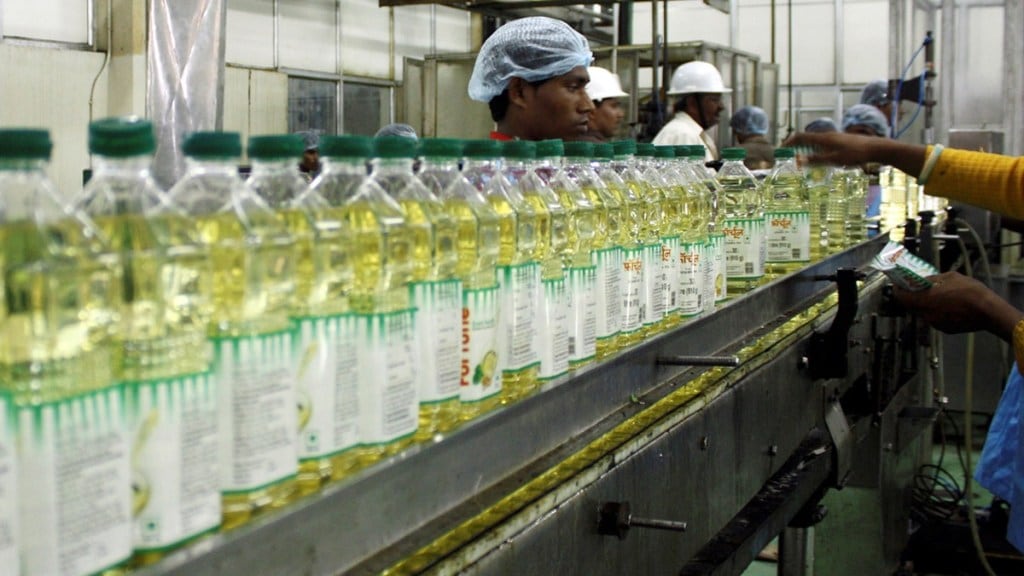Just days after Adani Enterprises (AEL) announced its plans to exit from Adani Wilmar, the FMCG major on Saturday released its standalone performance report for the quarter ended December 31, 2024, wherein it posted a revenue growth of 33 per cent on-year. The FMCG firm recorded a healthy 6 per cent YoY growth in volumes during Q3 despite significant price hikes driven by surge in raw material costs.
In a regulatory filing, Adani Wilmar said that although the edible oil segment saw a downtrading among consumers, the company maintained its market share by its strategy of having a diverse portfolio of brands at various price points. Further, in the foods category, key packed products such as wheat flours, rice, nuggets, pulses, poha, and sugar continued to experience robust double-digit growth, the business update stated.
Q3 performance for edible oil segment
In Q3, the demand for edible oil was impacted by a sharp rise in underlying commodity prices following the customs duty hike in mid-September. Compared to Q2, edible oil prices in Q3 were about 25 per cent higher, which led to consumers downgrading their purchases and a reduction in stock at the trade level. Moreover, palm oil prices, which are typically lower than other edible oils, surpassed the prices of other oils, causing consumers to switch to other affordable edible oils while sticking with value-for-money brands.
In Q3, Adani Wilmar’s edible oil volume grew by approximately 4 per cent YoY. However, branded sales declined in low single digits, primarily due to double-digit decline in packed palm oil sales and downtrading by consumers. Branded sales, it said, were supported by strong growth in both Sunflower and Mustard Oils. The segment’s revenue increased by 39 per cent YoY.
Q3 performance for food & FMCG segment
The Food & FMCG segment recorded a YoY revenue growth of 22 per cent in Q3. Excluding the G2G business (sales to government-appointed export agencies), revenue growth was around 20 per cent YoY, Adani Wilmar said. The segment continued to experience double-digit growth in both general trade and e-commerce channels. On LTM basis, the segment recorded revenue of around Rs 6,000 crore.
Distribution network
During the quarter in review, Adani Wilmar’s e-commerce (including quick commerce) sales volume continued to grow at 41 per cent YoY. The FMCG major has also been working towards capturing a fair share in South India and is now driving over 15 per cent volume growth for branded edible oils and foods combined. “This success has been driven by consistent marketing efforts and enhanced distribution capabilities,” it said.
In terms of rural market presence, Adani Wilmar said that the rural areas continued to drive faster growth for its Foods business, fueled by expanded coverage of rural towns and trial generation through combo offers. The company has also introduced smaller pack sizes for edible oils under the ‘King’s’ brand and adjusted pack sizes dynamically to keep the consumer price point within a narrow range.
The HORECA channel grew at a volume growth rate exceeding 35 per cent for YTD FY25, generating over Rs 600 crore in revenue on a Last Twelve Months (LTM) basis, with a well-balanced contribution from both edible oils and foods.
“The integrated distribution model is enabling us to leverage the strength of our oil distribution network to boost the reach of our food products, particularly in urban markets. This has been accomplished through various initiatives, such as loyalty programs for retailers, bundling offers for both retailers and consumers, targeting high-potential outlets, and refining salesman incentives,” Adani Wilmar said in a statement.
Earlier on December 30, Adani Enterprises Limited (AEL) had announced that it will exit from Adani Wilmar, the FMCG joint venture between its subsidiary Adani Commodities LLP (ACL) and Wilmar International owned Lence Pte (Lence), to focus investments on its core infrastructure business. The divestment of its share in Adani Wilmar will raise $2billion for AEL, which it said will be used to “turbocharge its investments in the core infrastructure platforms in energy & utility, transport & logistics and other adjacencies”.

